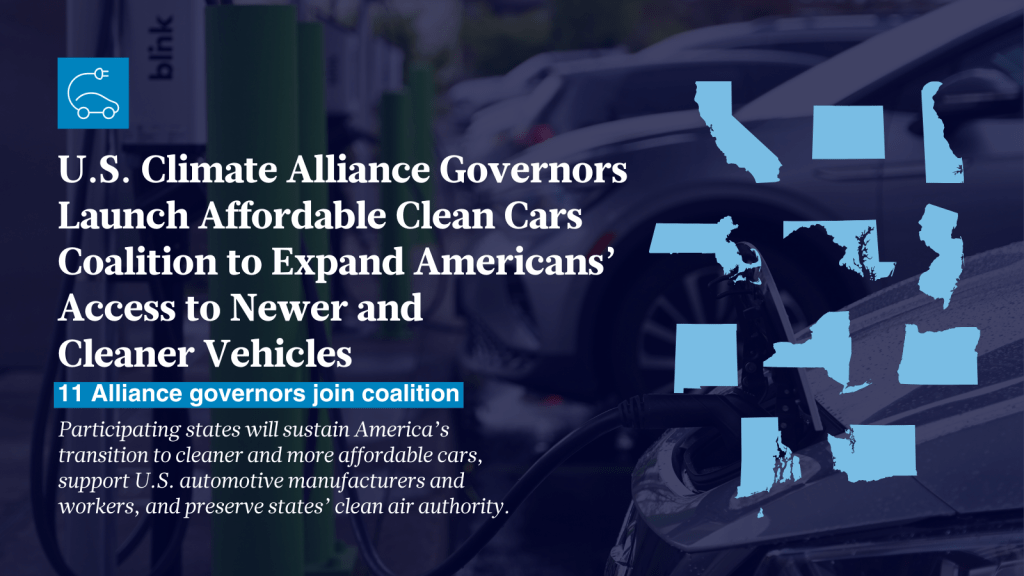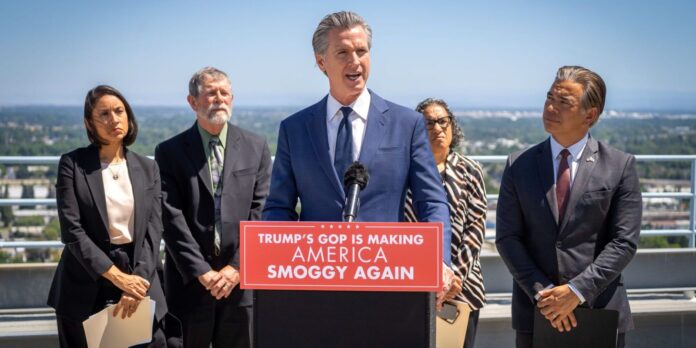Hot on the heels of Congress illegally attacking clean air, a coalition of 11 states has launched an Affordable Clean Cars Coalition to expand access to clean cars even as the federal government tries to raise costs for Americans and drag down the US auto industry during the all-important transition to EVs.
The coalition has been in the works for some time now, but official announcement couldn’t come at a better time.
Just yesterday, Congressional republicans moved on two separate efforts to increase pollution and harm the US auto industry, both by illegally voting to rescind a waiver they don’t have the authority to rescind and voting to send US EV jobs to China and give trillions of dollars to wealthy elites instead.
The new coalition includes 11 states whose governors want to protect their residents from these attacks, and to keep pushing forward on clean cars.
Here’s the list of governors:
- Gavin Newsom, California
- Jared Polis, Colorado
- Matt Meyer, Delaware
- Maura Healey, Massachusetts
- Wes Moore, Maryland
- Phil Murphy, New Jersey
- Michelle Lujan Grisham, New Mexico
- Kathy Hochul, New York
- Tina Kotek, Oregon
- Dan McKee, Rhode Island
- Bob Ferguson, Washington
The coalition represents over 100 million Americans and around 30% of the US car market. It’s a subset of the 24 states in the US Climate Alliance, a bipartisan coalition of 24 governors that represents ~60% of the US economy and 55% of the US population.
The US Climate Alliance has worked on several initiatives, including on cleaner construction materials, modernized grids, and of course clean cars.

The governors in the new Clean Cars Coalition closely (but not exactly) track the group of “section 177” states which follow California Air Resources Board’s clean air rules.
Section 177 is the portion of the federal Clean Air Act which allows California to ask for a waiver to set its own emissions rules, as long as those rules are stronger than federal rules, and lets other states follow the same rules, as long as they follow California’s rules exactly.
Not every state follows every rule, and each individual rule has somewhere around 10-12 states that follow it. Each of the states involved in today’s effort are section 177 states, but not every section 177 state is represented in this coalition.
States participating in the Affordable Clean Cars Coalition will collaborate to:
- Develop solutions that make cleaner vehicles more affordable and accessible to all Americans who want them, including by reducing cost barriers, increasing availability of options, and expanding accessible charging and fueling infrastructure at home and in our communities.
- Continue making progress toward the goals of states’ clean vehicle programs.
- Defend longstanding authority under the Clean Air Act for states to adopt transportation solutions that best meet their needs and most effectively support their families and communities.
- Explore opportunities to develop and adopt next-generation standards and programs to further reduce vehicle pollution, as permitted under the Clean Air Act or otherwise, such as solutions that increase consumer access to cleaner cars and low-carbon fuels.
- Collaborate with one another, share evidence-based practices, engage experts, and develop solutions that can be shared across state lines and eventually scaled by the federal government.
- Foster meaningful engagement with manufacturers, suppliers, dealers, labor unions, business associations, utilities, community-based organizations, charging and fueling infrastructure providers, and others in developing and successfully implementing state transportation solutions.
- Prioritize efforts that bolster America’s ability to compete and innovate in a growing global market.
Electrek’s Take
Today’s coalition is a similar effort to that which came out of the last time the federal government tried to force dirty air on states.
In fact, the US Climate Alliance was originally formed in 2017, in response to former reality TV host Donald Trump declaring that the US should pull out of the Paris Agreement (which Tesla CEO Elon Musk opposed at the time, but now relishes his chance to be “not good for America or the world“).
Mr. Trump also tried to attack California’s clean air rules many times the first time he squatted in the Oval Office (after losing the 2016 election by 3 million votes), but through a combination of being both morally and legally correct, California eventually won that fight.
Along the way, coalition-building like today’s made it clear who the eventual winner would be. California negotiated a clean car deal on its own with automakers, and several states took California’s side in a lawsuit against republican big government overreach. California even made international agreements and went to international climate conferences in the US’ stead, as Mr. Trump committed itself to diminishing the US on the international stage.
This time, the story looks like it’s starting to play out similarly. And since the players are the same (though some, somehow, are even stupider), and the importance and dominance of electric cars is more apparent now than ever, I wouldn’t bet on the outcome being all that different.
Charge your electric vehicle at home using rooftop solar panels. Find a reliable and competitively priced solar installer near you on EnergySage, for free. They have pre-vetted installers competing for your business, ensuring high-quality solutions and 20-30% savings. It’s free, with no sales calls until you choose an installer. Compare personalized solar quotes online and receive guidance from unbiased Energy Advisers. Get started here. – ad*
FTC: We use income earning auto affiliate links. More.


